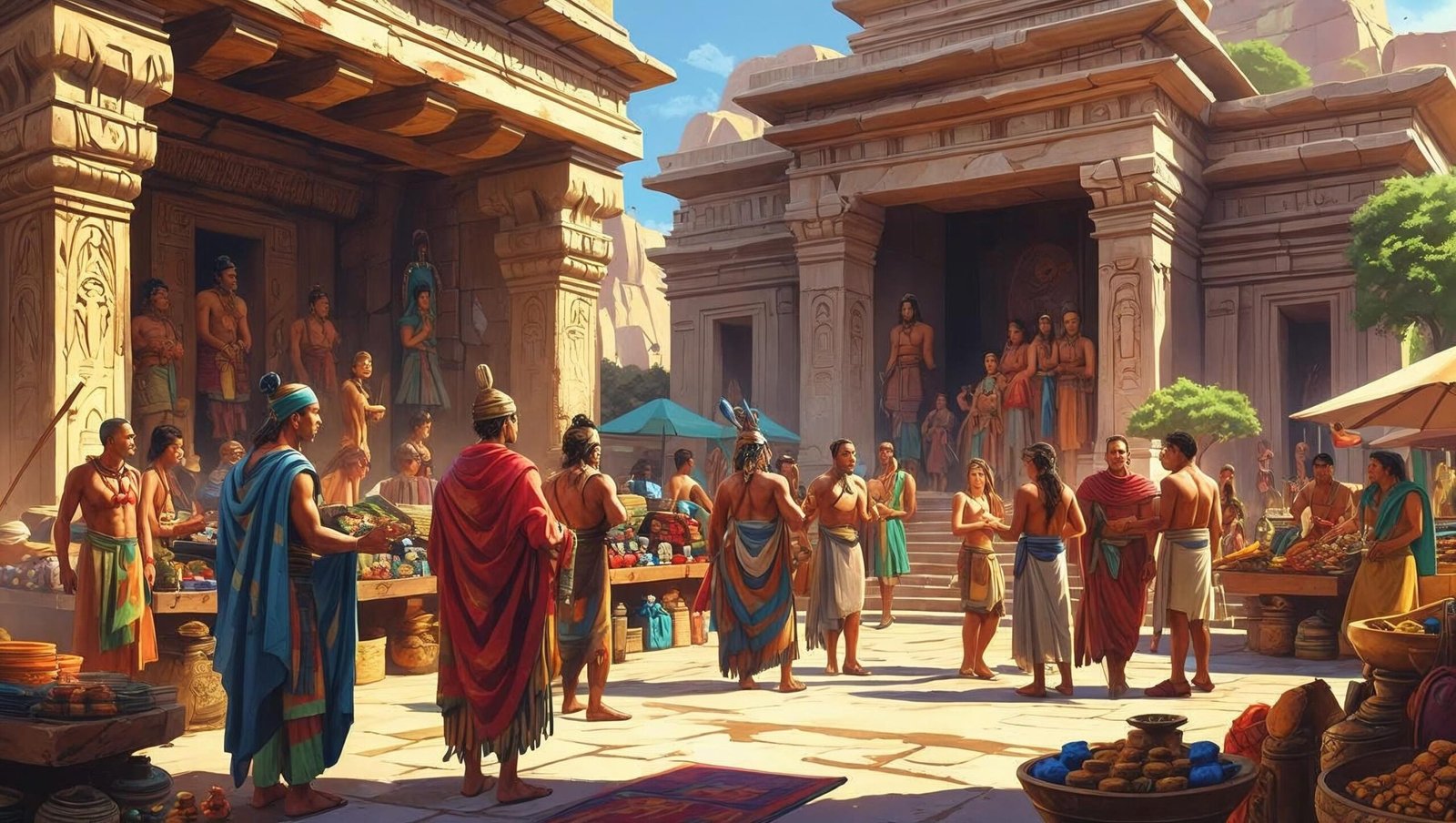Introduction
Every once in a generation, a book comes along that not only informs but transforms. Sapiens A Brief History of Humankind by Yuval Noah Harari is one such book. It is not just a chronicle of the past but a re-examination of the myths, systems, and revolutions that have shaped human civilisation.
From the origin of Homo sapiens to the future of artificial intelligence, Sapiens A Brief History of Humankind delves into the deep roots of our existence, unpacking complex phenomena in a way that is intellectually rigorous and accessible. This blog post reviews the book through the lens of seven powerful ideas that make it essential reading for anyone curious about our shared story.

1. The Cognitive Revolution – Our True Genesis
According to Sapiens A Brief History of Humankind, the real birth of humanity as we know it did not occur with the appearance of Homo sapiens anatomically, but with the Cognitive Revolution around 70,000 years ago. This event marks when humans started thinking abstractly, creating myths, and cooperating in large, flexible groups.
Yuval Noah Harari suggests that our ancestors’ ability to believe in shared fictions – such as religion, tribalism, and money – was a key evolutionary advantage. These myths allowed coordination on a large scale, setting us apart from other animals and rival human species.
2. The Agricultural Revolution – Humanity’s First Trap
In Sapiens A Brief History of Humankind, Harari argues that the Agricultural Revolution was history’s greatest fraud. While often viewed as progress, it actually led to more work, disease, and inequality. Humans went from a varied diet and free lifestyle to dependence on a few crops and increasingly hierarchical societies.
Wheat, rice, and maize domesticated humans, not the other way around, Harari claims. This reframing forces readers to re-evaluate what progress truly means and at what cost it comes.
3. The Invention of Fiction – Myths Make the World Go Round
A striking idea from Sapiens A Brief History of Humankind is the importance of shared fictions. Everything from nations to legal systems and corporations are made real only through collective belief.
Money, for instance, has no intrinsic value; it works because people believe in its worth. Harari demonstrates how our most powerful institutions are, in fact, intangible stories we’ve all agreed to tell and believe. It’s a profound commentary on how society operates, not through objective truths, but through widespread imagination.
4. The Unification of Humankind – Towards Globalism
One of the more optimistic themes in Sapiens A Brief History of Humankind is how humankind has gradually unified over time. Empires, trade, religion, and money have brought people together under shared norms and systems.
While not without suffering, this unification has made global cooperation possible. Harari explores how cultures that once clashed now trade, communicate, and even intermarry. Our modern identity as a global species is rooted in these historical trends.
5. The Scientific Revolution – Ignorance as a Catalyst
The Scientific Revolution, which began around 500 years ago, is a pivotal moment in Sapiens A Brief History of Humankind. Harari notes that it was the admission of ignorance, not the accumulation of knowledge, that triggered this new era.
By embracing the idea that we do not know everything, societies began to explore, experiment, and expand. This intellectual humility gave rise to modern science, industrialisation, and global conquest. It’s a subtle but powerful point: recognising what we do not know may be more important than knowing itself.

6. Capitalism and the Quest for Growth
Harari doesn’t shy away from critiquing modern economics in Sapiens A Brief History of Humankind. He argues that capitalism has become the most successful and destructive faith in human history. Rooted in credit, debt, and belief in eternal growth, capitalism has reshaped societies globally.
While it has lifted billions out of poverty and increased innovation, it has also accelerated inequality and environmental degradation. Harari prompts us to question whether constant growth is truly sustainable or desirable.
7. Homo Sapiens to Homo Deus – The Future of Our Species
The closing section of Sapiens A Brief History of Humankind ventures into speculative territory. With advances in biotechnology, artificial intelligence, and genetic engineering, humans may soon evolve into Homo Deus – god-like beings.
But this evolution poses deep ethical and existential questions. Who gets to decide what enhancements are acceptable? Will it create new divides between rich and poor, human and transhuman? Harari leaves us with a chilling warning: the future is in our hands, but are we wise enough to wield it?
8. Religion and Ideology – Tools of Large-Scale Cooperation
In Sapiens A Brief History of Humankind, Yuval Noah Harari offers a bold take on religion—not as a divine truth, but as an evolutionary tool. Religion, he asserts, is one of the most potent forces behind mass cooperation. Unlike familial or tribal ties, religion binds complete strangers into cohesive communities.
Harari discusses how early animistic beliefs gradually gave way to polytheism, and later, monotheism. Yet, his most striking argument is that even secular ideologies like liberalism, nationalism, and communism are modern religions. They rely on stories, values, and symbols, and demand loyalty and belief.
Religion, in Harari’s framework, is not about gods. It’s about order. And in the chaos of history, shared ideologies became the scaffolding on which empires were built. Sapiens A Brief History of Humankind pushes the reader to consider: is belief more about truth or utility?
9. The Role of Empire – Unity Through Power
Harari devotes a considerable portion of Sapiens A Brief History of Humankind to the rise and evolution of empires. Rather than demonising them, he presents a nuanced view: empires were both destructive and creative forces.
They crushed local cultures, enslaved millions, and waged relentless wars—but they also spread knowledge, built infrastructure, and created expansive trade networks. Empires unified diverse populations under shared administrative, religious, and legal systems.
The Roman Empire, the Caliphates, the British Raj—all of them played key roles in shaping the global world we now inhabit. Harari does not justify imperialism; rather, he illuminates its complex legacy. In the grand narrative of Sapiens A Brief History of Humankind, empires were evolutionary catalysts that carried forward both progress and pain.

10. The Industrial Revolution – From Muscle to Machine
One of the most impactful chapters in Sapiens A Brief History of Humankind is the exploration of the Industrial Revolution. Harari describes it as a profound turning point—not merely an economic shift, but a change in how humans relate to time, work, and nature.
Before industry, energy came from muscle, wood, and wind. Post-industrialisation, fossil fuels took over, launching unprecedented growth. People moved to cities, time became standardised, and work became synchronised with machines rather than natural cycles.
The impact on human psychology was immense. The rhythm of life changed. The family unit evolved. Education systems were redesigned to produce disciplined factory workers. Harari’s analysis in Sapiens A Brief History of Humankind suggests that while humans invented machines, machines also reinvented humans.
11. Consumerism – Happiness for Sale
You are what you consume. This modern mantra is dissected with surgical precision in Sapiens A Brief History of Humankind. Harari critiques how capitalism gave birth to consumerism—an ideology that turns buying into virtue and pleasure into obligation.
He explains that consumerism is not about need but about desire. It creates perpetual dissatisfaction, fuelling economic growth by encouraging people to want more, buy more, and waste more. Paradoxically, even though humans today live longer, eat better, and work less than at any point in history, we are not necessarily happier.
Harari presents startling statistics: depression and anxiety are on the rise globally. Sapiens A Brief History of Humankind challenges the reader to ponder—does shopping really lead to fulfilment, or are we all caught in a cycle of artificial craving?
12. Gender and Equality – Constructed Realities
Harari doesn’t shy away from controversial terrain. In Sapiens A Brief History of Humankind, he examines gender roles not as biological facts but as social constructs.
He argues that the dominance of patriarchal systems has no universal logic. In some societies, women held considerable power; in others, they were property. Harari makes a compelling case that gender roles are deeply tied to economic, cultural, and military needs—not natural law.
Moreover, the book highlights how even in today’s allegedly progressive world, inequality persists. From the pay gap to political representation, from education to reproductive rights—Harari urges us to examine the unconscious stories we tell about gender, power, and ability.
13. Artificial Intelligence – The New Frontier
Though not the main focus, Sapiens A Brief History of Humankind ventures into future threats. Harari foresees the rise of artificial intelligence and machine learning as the next evolutionary challenge.
What happens when machines surpass human intelligence? If algorithms can outperform us in work, art, and decision-making, will Homo sapiens remain relevant?
Harari poses unsettling questions: will the elite become superhuman while the majority become obsolete? Will AI foster new inequalities worse than any in history? Sapiens A Brief History of Humankind warns that our future may not be dystopian—it may be unimaginable.

14. Environmental Impact – The Cost of Domination
One of the most urgent themes in Sapiens A Brief History of Humankind is the environmental cost of human progress. Harari critiques how Homo sapiens has wreaked havoc on Earth’s ecosystems.
He presents archaeological evidence that humans were responsible for the extinction of megafauna across continents. From the mammoths of Siberia to the giant marsupials of Australia—our ancestors killed their way to the top of the food chain.
Today, deforestation, climate change, and mass extinctions continue that legacy. Harari sees environmental degradation not as a modern problem but as a historical pattern of domination.
The book pushes a sobering idea: intelligence without wisdom can be deadly.
15. Are We Happier? – The Question That Matters Most
Despite all the technological, economic, and medical advancements chronicled in Sapiens A Brief History of Humankind, Harari returns to a haunting question: Are we happier than our ancestors?
He admits the evidence is inconclusive. While life expectancy, literacy, and sanitation have improved, happiness remains elusive. Ancient hunter-gatherers may have had less stress, more leisure, and closer-knit communities.
The modern world offers convenience but often at the cost of isolation, overwork, and anxiety. Harari challenges the reader to not just think about history’s events but also their impact on human experience.
16. Final Thoughts from Harari – A Mirror, Not a Map
In his closing reflections, Harari doesn’t offer solutions. Instead, he offers clarity. Sapiens A Brief History of Humankind is not a guide to the future but a mirror reflecting our past.
By understanding how myths, ideologies, and revolutions shaped us, we can begin to question which stories we want to carry forward—and which we must abandon.
Harari’s ultimate message is one of humility. We have incredible power, but little wisdom. If we are to evolve—not just technologically, but ethically—we must look inward.
Interlude: The Power of Perspective
History isn’t just a collection of facts—it’s a lens that shapes how we view ourselves. When we examine ancient events through modern eyes, we not only gain knowledge but insight. Our assumptions are tested, our biases exposed, and our understanding of what it means to be human deepens significantly.
Reflection: Are We Evolving or Escaping?
In the race toward progress, are we genuinely evolving or simply escaping the consequences of our past? As societies build higher and faster, the foundation becomes more fragile. It’s a reminder that wisdom must grow with power, and ethical reflection must accompany scientific innovation if we are to sustain our future.
Note on Timeless Questions
Throughout time, humans have asked the same enduring questions: Who are we? Why are we here? What’s next? These aren’t just philosophical musings—they influence our choices, technologies, and relationships. Revisiting these timeless inquiries often brings clarity in moments of confusion, serving as a compass in the vast journey of civilization.
✅ Updated Conclusion
Sapiens A Brief History of Humankind is a sweeping, courageous, and profound exploration of who we are and how we came to be. Yuval Noah Harari challenges our most sacred beliefs and invites us to see our world with new eyes.
It’s a book that blends history, science, and philosophy to form a single, striking message: humanity is not the result of destiny, but of choice. And the future remains ours to write—if we are wise enough to understand our past.
🔗 For more thoughtful book reviews that spark introspection and growth, visit:
👉 shubhanshuinsights.com
Why Read Sapiens A Brief History of Humankind?
Harari’s work stands out because it combines academic research with storytelling. The narrative is both panoramic and personal, filled with provocative questions and shocking insights. Whether one is a student, a thinker, or a casual reader, Sapiens A Brief History of Humankind will challenge long-held assumptions about religion, politics, economics, and morality.
Harari’s Style and Tone
The prose in Sapiens A Brief History of Humankind is elegant, concise, and often witty. Harari makes complex concepts digestible without oversimplifying. He balances objectivity with philosophical reflection, encouraging readers to form their own conclusions.
The tone is analytical, sometimes critical, but never cynical. Harari’s ability to connect ideas across disciplines is one of the book’s strongest assets.

Criticism and Controversy
While Sapiens A Brief History of Humankind has been celebrated globally, it has also attracted criticism. Some historians argue that Harari glosses over important nuances or makes speculative leaps.
Others feel that the narrative sometimes leans more toward storytelling than scholarly analysis. Yet, its impact on public discourse is undeniable. Even critics admit that the book sparks essential conversations about humanity’s past and future.
FAQs About Sapiens A Brief History of Humankind
1. What is the main message of Sapiens A Brief History of Humankind?
The book argues that Homo sapiens became dominant through the power of imagination, storytelling, and cooperation — not brute strength or intelligence alone.
2. Is the book suitable for general readers?
Yes, Sapiens A Brief History of Humankind is written in accessible language and is ideal for readers from all backgrounds.
3. Does the book follow a strict historical timeline?
While loosely chronological, Harari frequently explores thematic connections across time periods, making the book more conceptual than linear.
4. Is the book scientifically accurate?
Harari bases his arguments on current academic research, but the book is not peer-reviewed and has faced criticism for generalisations and simplifications.
5. What subjects does the book cover?
It spans history, anthropology, economics, biology, sociology, politics, and technology — offering a multidisciplinary perspective.
Continue exploring the depths of human thought, history, and transformation. Each chapter of our past carries insight that can illuminate the choices we make for a better future.
For more such profound reviews, visit shubhanshuinsights.com — where we uncover the wisdom behind every powerful book.